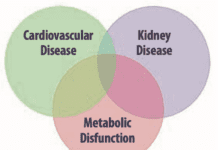The largest study of its kind to date may tip the scales on the controversial question of whether higher vitamin D levels are associated with reduced risk for colorectal cancer. Researchers drawing on data on more than a half-million participants in the European Prospec – tive Investigation into Cancer (EPIC) study concluded that people with the highest blood levels of vitamin D were up to 40% less likely to develop colo – rectal cancer compared to those with the lowest levels.The study compared the 1,248 EPIC participants diagnosed with colorectal cancer with an equal number of healthy controls. The researchers also compared high and low blood levels of vitamin D to a mid-range and showed that low levels were associated with an increased risk of cancer, especially in the colon. Vitamin D levels above the mid-range did show a reduced colorectal cancer risk, but the difference compared to the mid-range was not statistically significant. The study also found reduced risk associated with high consumption of dietary calcium.Scientists have been investigating the possible role of vitamin D in preventing cancer since the 1940s, when a study showed greater cancer incidence at higher latitudes, where weaker sunlight would make less natural vitamin D in the body. More recently, a clinical trial based on the Womens Health Initiative in 2006 reported that supplementation with vitamin D and calcium had no benefit against colorectal cancer. Some experts questioned those results, however, because of the complexity of the study and enrollment of participants in three overlapping trials. And in 2007 a meta-analysis published in the American Journal of Preventive Medicine came to a similar conclusion as the new EPIC study, finding an association between higher blood levels of vitamin D and lower colorectal cancer risk.Still, the EPIC researchers, led by Mazda Jenab, PhD, of the Interna – tional Agency for Research on Cancer (IARC-WHO) in Lyon, France, were cautious. Before any public health recommendations can be made for vitamin D supplementation, they said, new randomized trials are needed to test the hypothesis that increases in circulating vitamin D concentration are effective in reducing colorectal cancer risk without inducing serious adverse events.The study was not designed to show cause and effect, but Jenab and colleagues did highlight some possible mechanisms for the observed cancer protective effects of vitamin D, such as decreasing cell growth, inducing normal programmed cell death and reducing the development of new blood vessels. Vitamin D and calcium may be as essential to cancer protection as they are to bone formation.TO LEARN MORE: British Journal of Nutrition, Jan. 21, 2010; abstract at dx.doi.org/10.1136/bmj.b5500.
- #7213 (no title)
- About
- Cart
- Checkout
- Contact the Editor
- Contact Us
- Content restricted
- Customer Service
- Glossary
- Nutrition 101 – Glossary – J
- Nutrition 101 – Glossary – K
- Nutrition 101 – Glossary – L
- Nutrition 101 – Glossary – M
- Nutrition 101 – Glossary – N
- Nutrition 101 – Glossary – O
- Nutrition 101 – Glossary – P
- Nutrition 101 – Glossary – Q
- Nutrition 101 – Glossary – R
- Nutrition 101 – Glossary – S
- Nutrition 101 – Glossary – T
- Nutrition 101 – Glossary – A
- Nutrition 101 – Glossary – B
- Nutrition 101 – Glossary – C
- Nutrition 101 – Glossary – D
- Nutrition 101 – Glossary – E
- Nutrition 101 – Glossary – F
- Nutrition 101 – Glossary – G
- Nutrition 101 – Glossary – H
- Nutrition 101 – Glossary – I
- Nutrition 101 – Glossary – U
- Nutrition 101 – Glossary – V
- Nutrition 101 – Glossary – W
- Nutrition 101 – Glossary – X
- Nutrition 101 – Glossary – Y
- Nutrition 101 – Glossary – Z
- Manage Email
- My Account
- OFIE – Subscriber only
- Online Account Activation
- Privacy Policy
- Products
- Products
- Register
- Register
- Registration Complete
- Registration Complete
- Sample Page
- Subscribe
- Subscribe Now
- Tufts & Health Nutrition
- Tufts & Health Nutrition | JH Inforce
- Tufts & Health Nutrition | JHV Employee
- Tufts & Health Nutrition | John Hancock
- Tufts & Health Nutrition | Manulife Asia
- Tufts & Health Nutrition | Manulife Vitality
- Tufts & Health Nutrition | NU101
- Tufts & Health Nutrition | Tufts Employees
Copyright 2020 Tufts University Health & Nutrition Letter























